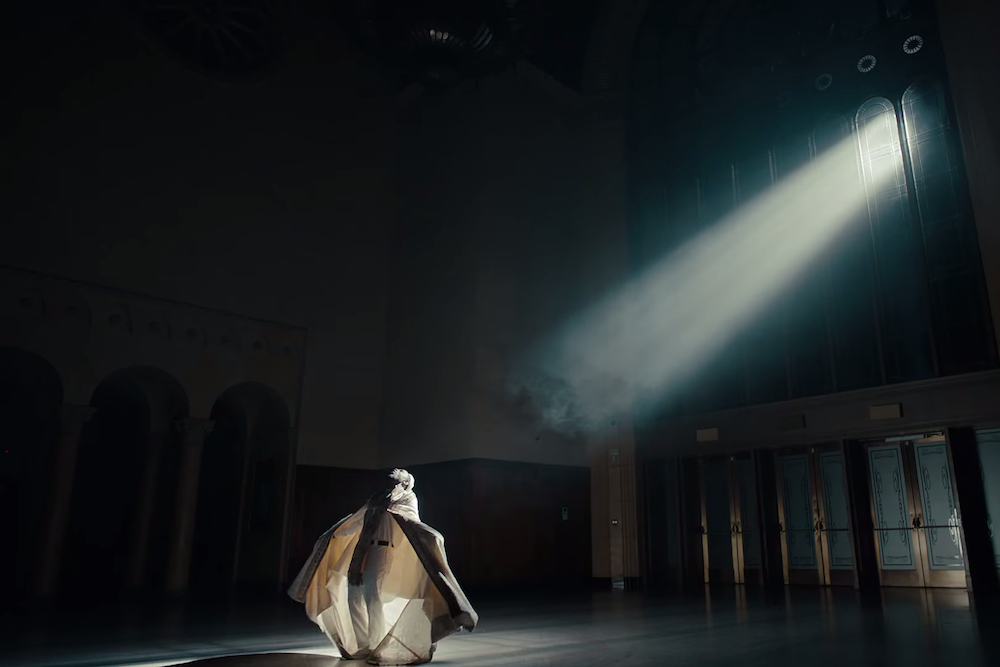Over the span of his career, Kendrick Lamar has progressed from hip-hop prodigy, to Cornrow Kenny, a prophet who happens to rap. In the video for his new song “HUMBLE.,” which dropped by surprise on Thursday evening, Lamar once again assumes a new form: the Young Pope. The flick, helmed by legendary director Dave Meyers along with The Little Homies, is as high-concept as most of Lamar’s videography, swapping through scenes that paint him as both a biblical messiah in full papal wardrobe, and his more standard identity as a street philosopher. After pronouncing himself as the greatest rapper alive on the recently released “The Heart Part 4,” Lamar mentions here that he is, in fact, “So damn great, motherfucker, I’ve died / What you hearing now is a paranormal vibe.” And so he appears on the opening shot of “HUMBLE.” adorned in religious imagery, arms splayed open, bathing in a ray of light before Mike WiLL Made-It’s demented piano riff kicks in.
The hysterics are another reminder that Lamar is at his most invigorating when rapping over bangers. Kendrick is more than a couple of steps away from the live instrumentation that was the base of To Pimp a Butterfly, an obvious risk because few artists would willingly venture outside of the aesthetic that awarded them so much acclaim. But Lamar is a daring rapper, and his turn back towards a mainstream sound on “HUMBLE.” is more than welcome. To Pimp a Butterfly, as beloved as it is, was exhausting even outside of its emotional context. The album is a project in which multiple strands of black music coalesce into one, and at times Lamar was subsumed by his own ambition. Sometimes that album is cathartic, but other times it is an on-the-nose re-appropriation of urban adult standards like Earth, Wind & Fire.
The album did have its more contemporary moments, though. “Alright,” a new civil rights anthem, centers itself around a knocking Pharrell-produced beat buttressed only by a saxophone. Then there’s “Hood Politics,” a vicarious chest-beater that moves through a maze of zooted atmospherics and hi-hats, climaxing with a shoutout to Killer Mike. If it didn’t serve as the album’s recurring bit, Lamar might’ve been able to cut out the album-ending Tupac Shakur interview to make way for “?untitled 07 | Levitate,” which appears, loosely constructed, on 2016’s outtakes compilation untitled unmastered. If it had been able to conclude an hour of the examination of black pain, “Levitate” could have worked as electrifying catharsis.
https://youtube.com/watch?v=GwamhuY6Yy8%3Fecver%3D1
This isn’t to say modern times call for strictly 808s, nor does it mean Lamar is always hit-or-miss rapping over a more live sound. His ambition and its specificity have set him apart from his peers, but bangers have given his worldview its sinew. To Pimp a Butterfly is sold as Lamar’s “urgent” masterpiece, but his major-label debut good kid, m.A.A.d city feels more so by insisting itself as such. Lamar’s nasally presence, combined with more conventional beats by people like Hit-Boy and DJ Dahi, created an immediacy that’s largely absent from TPAB. In fact, it’s possible that Lamar wouldn’t even have had the cachet to make TPAB if electric good kid songs like “Backseat Freestyle,” “Money Trees,” and “m.A.A.d city” didn’t worm their way onto the radio. “Cartoon and Cereal,” a one-off leak featuring Gunplay, still ranks among Lamar’s greatest songs despite him dropping two albums and a Taylor Swift collaboration since its release.
That streak continues with “HUMBLE.” Many quickly pointed out the production’s similarities to other hyper-recent piano-banging compositions—specifically Rae Sremmurd’s “By Chance” and Jimmy Wopo’s “Elm Street”—but it’s still enough of a spark to reignite Lamar’s audacity. Over three minutes, he shouts out TED Talks, demands a woman with a Richard Pryor afro, and allegedly snatches Big Sean’s cadence and ad-lib to diss him. His thoughts are scattered, but the 808s give them direction. TPAB was momentous not only because it was a salve for the proliferation of images of African-American death, but also because of how it represented a dramatic shift for one of the genre’s strongest gravitational forces. But it was a moment, and just that. With “HUMBLE.,” Lamar simultaneously makes another leap while retaining exactly what made him great in the first place.
https://youtube.com/watch?v=tvTRZJ-4EyI%3Fecver%3D1





